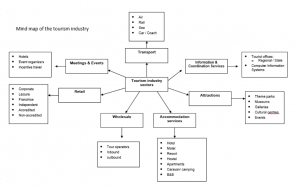SITTTSL001 – Operate an online information system
Upon completion of this unit you will be able to;
- Access online information
- Check and download information
Introduction
The tourism industry is made up of many different sectors; all providing specific services and you will learn about them in detail in later units. For now, however, lets look at the seven main sectors of this industry and the type of information you may need to source.
These seven sectors are;
- Transport
- Accommodation services
- Attractions
- Wholesale
- Retail
- Meetings and events
- Information services
Each of these sectors will be made up of a range of different subsectors, as shown in the mind map above, and each of these, in turn, will be made up of individual companies. In order to best serve your customers you will need to source not only information about each sector and subsector of the industry, but often also on individual companies.
For example; what is the difference between travelling on Jetstar or Qantas Airways? Is it worth the extra money to travel in First Class … and who’s first class service is best and offers the most value for the money spent.

You will need to have information, not only of interest to the customer directly, but also of interest to the organisation you work for, in the running of its operation. We will examine both aspects as we move through the unit.
Access Online Information
Depending on the organisation, or sector of tourism, you work in, the systems you access and the information you need will vary. Working for an airline or a particular hotel means that you will very probably be working with their own internal booking and information systems.
While these systems do provide other product or destination information, this is restricted to and about their own company. For example, British Airways would not include detailed descriptions about Lufthansa products or services, and Qantas would not provide detailed information about the services offered by Singapore Airlines.
Providing information to a client, however, often means that you need to access information on all companies and destinations and you must be able to do this without prejudice. For this reason, most travel agents use GDS and other online information systems to provide a more complete information service.
Determining information requirements.
Depending of the type of tourism product involved in a customer’s enquiry, there are a range of things that they will need to know in order to make the right decision about where to go and what to do. In looking at the seven sectors of the industry from the previous page, some of the information requirements will be industry or sector specific.
For example; .… examples shown in learner guide ….
These are only some of the information requirements a person might have when looking at tourism products and services. In addition to the industry and sector based information, you may also need to provide advice about;
- Passport and visa requirements – travelling outside Australia will always require a passport; some countries will also, however, require a traveller to have a visa to enter their country. This type of information is extremely important as, without the correct visa, the traveller may not be allowed to stay.
- Health issues – there are some countries in the world where there are risks of contracting specific diseases or illnesses and it is an important role of anyone offering advice to travellers to make them aware of these health issues
- Travel warnings – some countries pose security issues for travellers; there may be terrorism threats or military actions that a person wishing to visit that country will need to be aware of.
- Customs information – most countries, including Australia, place restrictions of the type and amount of certain substances, products or even money, that a person may import into or export out of their country. Travellers will need to be made aware of the restrictions relevant to their destinations in order not to break the local laws.
- Insurance options – it is never a good idea to travel, particularly overseas, without taking out travel insurance. This is more relevant in some countries that others; becoming ill and needing medical or hospital care in the United States, for example, can be very very costly and a person who cannot show that they can cover the cost of care may even be rejected.
So a person who wants to know about travelling to India, for example, will need to know;
- How to get there (different airline options; days of the week they can travel, how long the flight will be and so on)
- What the fare will be
- What passport, visa, customers and health requirements are for that country
- Where to go and what to see once they get there
- Where to stay (what facilities their accommodation will have)
- Currency information so they know how much money to take (and in what format; cash, credit card, travellers cheques)
- Any issues about food in that country (what to look out for so you don’t get sick)
… continued in learner guide ….
